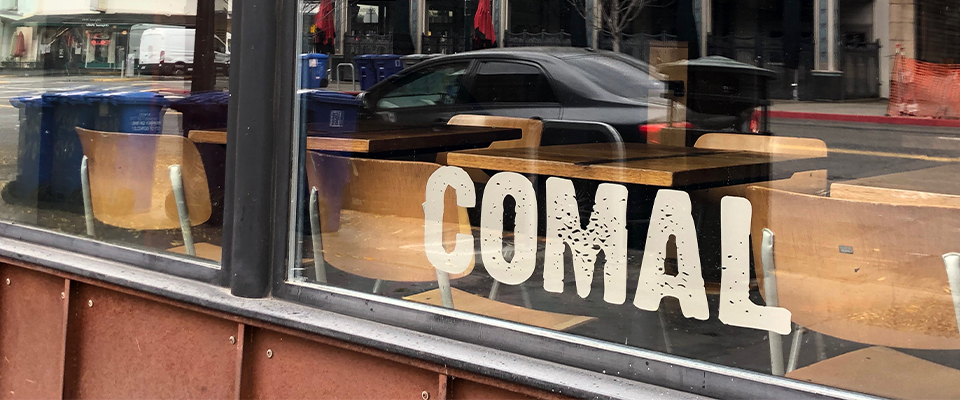Ladan Sanjani can barely focus on today let alone tomorrow. She and her husband, Farhad Jalali, own Pasta Bene, an Italian restaurant on Telegraph Avenue, just blocks from the campus their son attended. Now they are struggling to keep the lights on in the face of a crisis that seems to have darkened every corner of the globe.
A little more than a week since the shelter-in-place order was issued in the Bay Area (and which now applies to all of California), Pasta Bene, which opened in 2010, has begun selling meals for delivery and curbside pickup only. And while loyal customers have rallied to their support, revenues have dropped by more than half. Sanjani is not sure how much longer the business can last.

“We’re hoping for relief from the government, from the utility companies,” she says. “But we just don’t know. And it breaks my heart to think about what might happen next.”
She’s not alone.
As economic fallout from the coronavirus outbreak spreads across the country, restaurants everywhere are reeling. The struggles of Pasta Bene and other local eateries reflect the larger plight of an industry in survival mode.
“At this point, we’re basically just circling the wagons,” says John Paluska, co-owner of Comal and Comal Next Door, sibling Mexican restaurants in downtown Berkeley. “Our main concern now is making sure that we are in a position where we are able to reopen so that our staff has somewhere to come back to when this all finally passes.”
Even in robust economic times, many restaurants operate on razor-thin margins, covering this week’s payroll with last week’s receipts.
Paluska has been prescient; on March 14, two days before six Bay Area counties required the closure of “non-essential” businesses, he preempted government officials by shutting down both of his Berkeley restaurants. It was, he says, a wrenching decision that meant laying off nearly 120 employees. But Paluska felt he had no other choice.
“You could see it coming every step of the way, as governmental bodies on every level were reluctantly going to stricter and stricter measures,” he says. “It became clear to us that we simply couldn’t remain open without putting ourselves, our staff, and the community at risk.”
Having done what he could for public safety, Paluska turned to questions of financial health. Even in robust economic times, many restaurants operate on razor-thin margins, covering this week’s payroll with last week’s receipts.
Many restaurant employees run even closer to the bone. At Comal, which opened in 2012, Paluska says that he has often operated as a makeshift credit union, issuing paychecks early or floating no-interest loans to employees caught in a pinch.
“Everything is a little surreal right now, and we’re having to make really fast decisions that have big financial consequences,” Paluska says. “But there’s also a human element and it’s devastating. We realize that many restaurant workers are already living paycheck to paycheck, and we’re trying to do everything we can to help.”
Chez Panisse began offering CSA boxes for pickup at the restaurant, 100 produce-filled care packages in total. They sold out almost immediately.
To soften the blow, Paluska has set up office hours with his human resources department where employees can get help navigating their unemployment applications. He and his business partner are also exploring ways to continue supporting their managerial staff during the shutdown, but it’s difficult amid all the uncertainties.
“This is not like a storm or some other crisis where you have a sense of when it might be over,” Paluska says. “We have no idea how long we’re going to remain closed, how long we’re going to have to ride this out, or even what people’s appetite to gather in restaurants is going to be. Throw in the fact that we’re likely heading into a recession… .”
As government officials haggle over the details of potential relief packages, restaurants, like countless small businesses, have been left to fend for themselves. Paluska says that he’s been in conversation with his landlord about partial or temporary rent forgiveness. There’s also a good chance he’ll be turning to investors for a cash infusion, if and when the time comes to “prime the pumps.”
As for generating revenue in the interim, Paluska has decided against take-out service because he’s not convinced that it can be done safely. (It should be noted that, according to the CDC, “there is no evidence to support transmission of COVID-19 associated with food”). That decision makes him something of an outlier. Since shelter-in-place began, delivery services such as Caviar, Grubhub, and Doordash have become lifelines for many Berkeley restaurants. Curbside pickups have also grown increasingly common, with options ranging from ready-to-eat meals to meal-kits composed of staples like stocks and grains.

In desperate times, all options are on the table. Some restaurants have been sending out email blasts asking customers to purchase gift certificates. Others, including Berkeley’s Gather restaurant and Oakland’s Beauty Bagels have launched GoFundMe campaigns to support their newly out-of-work staff.
Few restaurants, if any, are beyond needing help.
“At first we thought we might do three things that might be beneficial,” says Jennifer Sherman, general manager of Berkeley’s world-famous Chez Panisse. “But we’ve come to realize that’s probably going to have to be a thousand little things that we all do to contribute in order to be able to continue.”
“All we are doing is just working, working and trying our best because trying our best is really all that we can do.” —Ladan Sanjani, Pasta Bene owner
Like Comal, Chez Panisse closed two days before the Bay Area shelter-in-place order, the better to safeguard its staff and patrons from the virus. It then furloughed its roughly 110 employees so they could start collecting unemployment checks immediately. At the same time, the restaurant has been covering its share of employee health care benefits, and plans to do so, Sherman says, for as long as it can. Chez Panisse, too, has a GoFundMe with a goal of $200,000 for employee relief.
Chez Panisse may be better off than most. Established by Cal alumna Alice Waters in 1971, the restaurant owns the wood-shingled building it operates in, and it has some money in cash reserves. But it also carries a high overhead, which includes rent on separate offices and relatively generous salaries and benefits packages for its employees.
Last week, to support the farmers who supply its kitchen with highest-quality produce, Chez Panisse began offering CSA (Community-supported agriculture) boxes for pickup at the restaurant, 100 produce-filled care packages in total. They sold out almost immediately.

“In the end, the money from that is going to net the restaurant next to nothing,” Sherman says. “I started asking myself, ‘Why are we even bothering with this?’ And the answer is that at least it is serving a purpose. And it gives us something positive to do.”
Meanwhile, at Pasta Bene, they’ve kept their usual hours, from 11 a.m. to 10 p.m daily. She says staff wear gloves and change them regularly while extra attention is given to cleanliness. They’ve set up tables as a buffer between staff and customers. Orders are left on the table for the exchange, so there is no direct handoff.
Hospital and medical workers are offered 20 percent off purchases.
Remarkably, they’ve yet to layoff any of their 15 employees. But nothing is guaranteed.
“All we are doing is just working, working and trying our best,” Sanjani says. “Because trying our best is really all that we can do.”
In the restaurant business? Tell us how you’re coping in the comments.



















